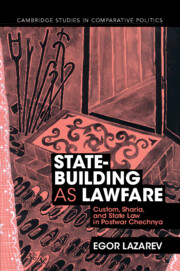‘This is a fascinating, deeply researched, and creative study of legal pluralism in Chechnya. Based on months of ethnographic field work, scores of interviews and informal conversations, and analysis of original surveys, State-Building as Lawfare contributes to our understanding of post-conflict dynamics and the impact of warfare on state and society, and, especially, on gender.’
Matthew Evangelista - Cornell University
‘A marvel of comparative politics scholarship. Blending surveys, courtroom observations, and interviews, Lazarev shows us how officials manipulate state and non-state legal systems and how ordinary people make choices that shape state sovereignty.’
Mark Fathi Massoud - UC Santa Cruz and author of Shari‘a, Inshallah
‘State Building as Lawfare is a tour de force. Contra the conventional wisdom, Lazarev highlights how government officials and members of the population both engage in “forum shopping” between state and non-state justice institutions to advance their interests, resulting in a bottom-up process of state-building that is deeply gendered. Based on exceptional multi-methods fieldwork in Chechnya, a challenging site for rigorous research, Lazarev combines extensive interviews and observations with original surveys and administrative data.’
Melani Cammett - Harvard University
‘Contrary to many conventional accounts that portray Chechnya as a lawless realm, the political scientist Lazarev’s well-researched study draws on extensive field work to describe this region of Russia as a scene of legal pluralism … Despite the intricacies of its subject, the book is highly readable, its academic narrative interspersed with curious legal cases and episodes from the author’s own experience navigating Chechnya.’
Maria Lipman
Source: Foreign Affairs
‘A great example of how anthropology may enrich political and legal studies.’
Florian Muehlfried
Source: Social Anthropology/Anthropologie sociale



